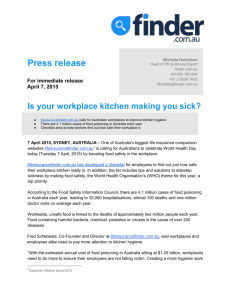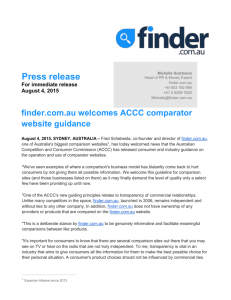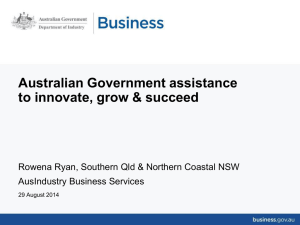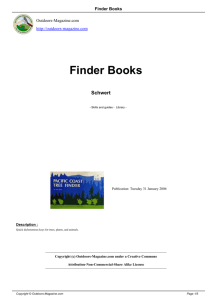Press release - Amazon Web Services
advertisement
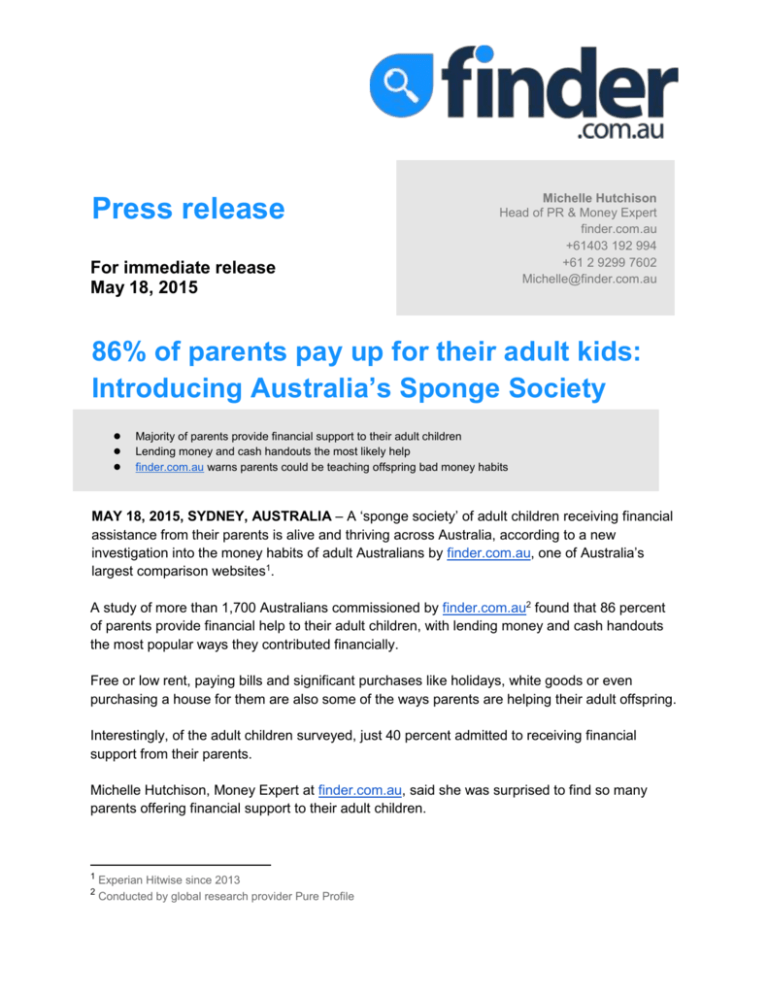
Press release For immediate release May 18, 2015 Michelle Hutchison Head of PR & Money Expert finder.com.au +61403 192 994 +61 2 9299 7602 Michelle@finder.com.au 86% of parents pay up for their adult kids: Introducing Australia’s Sponge Society ● ● ● Majority of parents provide financial support to their adult children Lending money and cash handouts the most likely help finder.com.au warns parents could be teaching offspring bad money habits MAY 18, 2015, SYDNEY, AUSTRALIA – A ‘sponge society’ of adult children receiving financial assistance from their parents is alive and thriving across Australia, according to a new investigation into the money habits of adult Australians by finder.com.au, one of Australia’s largest comparison websites1. A study of more than 1,700 Australians commissioned by finder.com.au2 found that 86 percent of parents provide financial help to their adult children, with lending money and cash handouts the most popular ways they contributed financially. Free or low rent, paying bills and significant purchases like holidays, white goods or even purchasing a house for them are also some of the ways parents are helping their adult offspring. Interestingly, of the adult children surveyed, just 40 percent admitted to receiving financial support from their parents. Michelle Hutchison, Money Expert at finder.com.au, said she was surprised to find so many parents offering financial support to their adult children. 1 2 Experian Hitwise since 2013 Conducted by global research provider Pure Profile “Many parents want to help their children get ahead but if they aren’t careful it can be detrimental to their financial well being. “Among the parents offering financial support, 29 percent say their kids struggle to manage their money, while one in five say they received financial help from their parents as a young adult and wanted to do the same for their own children. A further 18 percent say no financial support from their own parents motivates them to help their children. “While more than half of adult children – 57 percent – have only received help from their parents as a ‘once-off’, almost 19 percent admit to receiving handouts several times a year, with 7 percent given financial assistance monthly, 7 percent weekly and 6 percent even daily. “Here is where the problem lies: when quizzed on why their parents help them out financially, over half (53 percent) said their parents offer. Fifteen percent admit it’s because they struggle to manage their money, while nine percent admit it’s because they’re in debt. “It’s expensive to live in Australia, especially in capital cities and close to CBDs, which is where most people work. The Survey found that 15 percent – or one in six Australians – get financial help from their parents because they are saving for a home loan deposit. But we need to teach our kids the value of living within their means otherwise they won’t have a sustainable future.” While 70 percent of adult children are grateful for the financial help from their parents, almost one in five are embarrassed by it. Just seven percent are proud to admit it. State by state: VIC: The biggest sponge state is Victoria, with 45 percent of people counting on parents for financial help. They are also the most likely to get daily financial help, with 8 percent of adult children doing so, compared to the Australian average of 6 percent. NSW: New South Wales respondents count on their parents for housing more than any other state, with 19 percent getting free or low rent. TAS: Tasmanians are the most independent with 67 percent not receiving any financial help from the older generation. QLD: Queenslanders are most likely to receive a ‘once-off’ helping hand from their parents and are most likely to feel embarrassed by the financial help – 22 percent feel embarrassed compared to the national average of 19 percent. SA: South Australians (78 percent) are the most grateful for the financial assistance from their parents. WA: Western Australian parents appear to be the most generous with 43 percent offering to help their adult children without being asked. Male versus female More women receive financial help from their parents than men, and women receive more financial help on a regular basis while men get more help for once-off occurrences. Men are more likely to receive financial help for a home loan deposit while women are more likely to get help because their parents offer. Home loan help finder.com.au’s study found that Generation Y (those aged 18-34) more likely to receive help on a daily basis and are more likely to be helped with saving for a home loan deposit or because they don’t have a job. In fact, more than one in four (26 percent) of Gen Y accept financial help from their parents because they are saving for a home loan deposit, while 12 percent of Generation X (those aged 35-54) accept financial help from their parents because they’re saving for a home loan deposit. Interestingly, one in 10 Baby Boomers (those aged 55-74) still receive financial support from a parent due to saving for a home loan deposit. Overall, Generation Y receive more financial help from their parents, with 63 percent admitting to receiving a handout, followed by Gen X (47 percent) and then Baby Boomers (26 percent). Baby Boomers are more likely to accept financial help because their parents offer and are most grateful for the help they receive. While Gen X were most embarrassed by their parents helping them out, with over one in five (21 percent) feeling guilty. Gen Y were most happy and proud to admit they receive financial help. “Giving adult children wads of cash, paying their bills or letting them live rent-free is creating a ‘sponge society’ where people may not learn how to live within their means, understand the value of money, budgeting and saving. “It’s important for parents to stop feeling depended on. They need to focus on their futures too. “Set clear parameters,” advises Mrs Hutchison. “Parents should ask themselves if the financial assistance will empower their child or enable them. Define the nature of the financial help – communication is key. Outline upfront whether it is a loan or a gift and the limits of your support to make sure they are working hard to be self-sufficient.” ### For further information: Michelle Hutchison Head of PR | Money Expert finder.com.au +61403 192 994 +61 2 9299 7602 Michelle@finder.com.au Bessie Hassan PR Manager finder.com.au +61402 567 568 +61 2 9299 7602 Bessie@finder.com.au About finder.com.au: finder.com.au is one of Australia’s biggest comparison websites and has helped over 4.8 million Australians find better credit cards, home loans, life insurance, shopping deals and more since 2006. finder.com.au compares 250 credit and debit cards from 31 providers, over 300 home loan products, and information from 13 life insurance providers as well as online shopping promo codes, mobile phone plans, travel insurance and more. One Australian every five minutes is using finder.com.au or one of its network sites creditcardfinder.com.au and lifeinsurancefinder.com.au to find better (Source: Google Analytics). Disclaimer: Hive Empire Pty Ltd (trading as finder.com.au, ABN: 18 118 785 121) provides factual information, general advice and services on financial products as a Corporate Authorised Representative (432664) of Advice Evolution Pty Ltd AFSL 342880. Please refer to our FSG and Credit Licence ACL 385509. We are also a Corporate Authorised Representative of Countrywide Tolstrup Financial Services Group Pty Ltd. ABN 51 586 953 292 AFSL 244436 for the provision of online travel insurance. We are not owned by any Bank or Insurer and we are not a product issuer or a credit provider. Although we cover a wide range of products, providers and services we don't cover every product, provider or service available in the market. We also don't recommend specific products, services or providers. If you decide to apply for a product or service through our website you will be dealing directly with the provider of that product or service and not with us. We recommend consumers understand the Product Disclosure Statements before deciding if a product is right for them (c) 2013.
